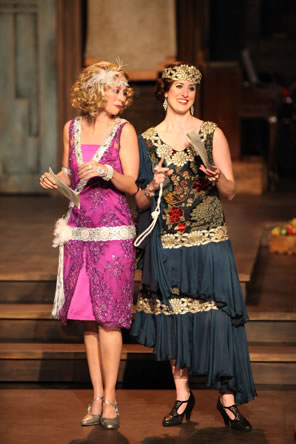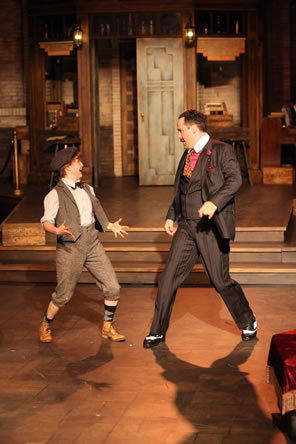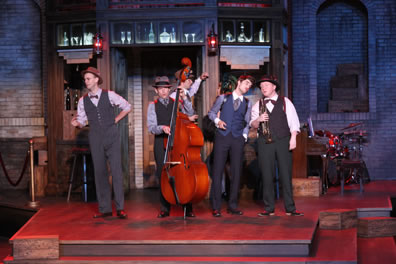Love’s Labour’s Lost
Speech-Heavy Comedy As a Speakeasy Musical
Bard on the Beach, Howard Family Stage, Vancouver, British Columbia
Friday, August 14, 2015, Section 2, B–36 & 37 (center of center seating in deep thrust theater)
Directed by Daryl Cloran
Don Armato needs help coming up with the words for the passion he feels for Jaquenetta. Holofernes hands him a book. "What is this?" Don Armato asks. "It's Shakespeare," Holofernes replies, whereupon Armato throws away the book. It's a joke, see, but like all good jokes, there's a measure of truth in it: this Bard on the Beach production of Love's Labour's Lost throws away much of William Shakespeare's text and instead fills out the play with songs of America's Jazz Age.

Princess (Lindsey Angell, left) and Rosaline (Luisa Jojic) enjoy their love tokens in Bard on the Beach's speakeasy musical production of William Shakespeare's Love's Labour's Lost. Photo by David Blue, Bard on the Beach.
I've seen Love's Labour's Lost work just fine on its own merits, but many directors prefer to duck the play's obtuse jokes and a verse structure so complex that Shakespeare himself makes fun of it within the play. A favorite feint seems to be to turn the play into a modern musical. Even such a revered Shakespearean as Kenneth Branagh did that in his 2000 cinematic version, setting the play as a 1930s musical (complete with tap-dancing and choreographed swimmers) in a pre-World War II Navarre. The Public's Shakespeare in the Park production in 2013 set Love's Labour's Lost to new music by Michael Friedman and shoehorned its plot into a college reunion at a wilderness resort.
Daryl Cloran also takes a musical route with this Bard on the Beach production. Navarre is a speakeasy club during Prohibition, its owner Ferdinand is known as "The King," his fellow academics (only Berowne and Dumain—Longeville is dropped) are gangsters packing pistols in shoulder holsters, and Princess is the daughter of Ferdinand's chief rival, who arrives with her "close friends" Rosaline and Katherine (Maria is dropped), and her chaperone, Boyet. Costard is the nightclub's MC, Jaquenetta a flapper, Holofernes is the club's musical director, Dull the bouncer, and Armato a "visiting Don" with a thick Italian (rather than Spanish) accent.
These changes in the dramatis personae and setting presage much gutting of Shakespeare's text, so if your Bardolotry is of the fundamental type, you'll likely prefer to stay clear and keep your nose in joint. But if it's great theater you want or, more specifically here, great music and fun entertainment, this is a Labour's to love. With good acting all around, the production's star performer nevertheless is the band, as tight a unit as you will hear in any real nightclub: Holofernes (Musical Director Ben Elliott) on piano, Dull (Jeff Gladstone) on bass, Dumain (Daniel Doheny) on drums, and Costard (Andrew Cownden) on trumpet. Moth (Lili Beaudoin) sometimes filling in on the trap set, and on one number Cownden plays both trumpet and drums simultaneously.
The production's signature moment comes when Princess (Lindsey Angell) and her friends (Luisa Jojic as Rosaline, Sereana Malani as Katherine) come on stage with the lords' love tokens and sonnets and sing Cole Porter's "Night and Day": "Like the beat beat beat of the tom-tom… So a voice within me keeps repeating you, you, you; Night and day, you are the one." With a bit of soft shoe and perfectly blended voices, the song melts you like a lilting reading of Sonnet 116.
Not all is song and dance, though. The Shakespeare that remains intact is well done, especially Berowne's "Have at you, then, affection's men at arms" speech, which Josh Epstein expertly delivers with both nuanced logic and poetic verve. The play's centerpiece scene, the "four woodcocks in a dish" of the lords discovering each other's transgressions, is a hoot here, even though its effect is reduced by one lord—credit Epstein as Berowne hiding in the audience, snatching one patron's popcorn, sipping another's coffee, and sitting on one man's lap. "Ah, good my liege," Berowne says, stepping onto the stage to reveal himself to Ferdinand (Jay Hindle) and Dumain, but for the second half of this line Epstein turns back to the man on whose lap he sat and directs his "I pray thee, pardon me" to him.
Cloran cuts much of the text—my rough estimate is well over 50 percent—and yet, he interpolates text from another play. In the final scene when Don Armato and his cronies are performing the pageant of the Worthies, the Princess comments, "This is the silliest stuff I ever heard," Hippolyta's line from A Midsummer Night's Dream watching the rude mechanicals, whereupon Theseus, er, Ferdinand explains that "The best in this kind are but shadows; and the worst are no worse, if imagination amend them." Cloran also makes many alterations to the characters and situations. For example, instead of Cossacks the lords pretend to be French aviators; no longer "Disguised like Muscovites, in shapeless gear" but "Disguised as barnstormers in full flight."
Moments like that might make even the most liberal Shakespearean shudder. But Cloran respects the heart of Shakespeare's play, and both his economy of characters and his overall ability to translate a 16th century court into a Prohibition speakeasy joint is quite the accomplishment. In Shakespeare's text, Dull the officer tries to impress the self-proclaimed intellectual superiors Holofernes and Sir Nathaniel (the latter cut in this production) with a riddle: "Can you tell me by your wit what was a month old at Cain's birth, that's not five weeks old as yet?" Here, Dull the marble-mouthed bouncer is seeking the answer for a clue in a crossword puzzle. The territory in question between Ferdinand and his rival, the Princess' father, is "the North Side." The lords bring out a pup tent for the ladies to stay in. Cownden ably turns Costard's obtuse humor into bada-boom jokes as an MC, and Moth is forced to fill time during the Worthies' pageant by doing Shakespearean knock-knock jokes with the audience ("Knock knock." "Who's there?" "Toby." "Toby who?" "Toby or not Toby.").
Then there's Don Armato. Ah, how do you dare turn Shakespeare's great creation of the renaissance Spanish blowhard Don Armado into the gangland "Italian swain" Don Armato? By casting Andrew McNee in the role and having him play Armato with Robert De Niro over-the-top panache. Though his "Spaniard's rapier" is now his "Italian's rapier" and is really the pistol he waves about, this Armato is as richly delivered and textually funny as any Armado I've seen, and notably he fits exactly Holofernes description of him: "His humor is lofty, his discourse peremptory, his tongue filed, his eye ambitious, his gait majestical, and his general behavior vain, ridiculous, and thrasonical… He draweth out the thread of his verbosity finer than the staple of his argument."
Cloran's production realizes something many directors miss with Love's Labour's Lost: though the centerpiece plot of the lords sworn to devout study swooning at the arrival of the ladies is full of intellectual poetry and academic allusions, the rest of the characters in Navarre are clowns, sluts, and foolish braggarts. Comedy literally runs rampant in this play, and if you let that humor infect the high-end verse of the lords and ladies, they become charmingly funny, as well.

Moth (Lili Beaudoin, left) and Don Armato (Andrew McNee) share a dance and a smile that will go a long long way in Bard on the Beach's production of William Shakespeare's Love's Labour's Lost. Photo by David Blue, Bard on the Beach.
Cloran sets the tone before we even enter Navarre; Moth and Armato stand at the door greeting us as we enter the theater. "Are you two gonna behave?" Armato asks my wife and me as he shook my hand. "We'll try," I reply, with no idea I was speaking to the great Arma(d)o. "Well don't try too hard. We want you to have a good time here," he says, guffaws, and slaps me on the shoulder. Good time? Hell yes! Inside, Scenic Designer Marshall McMahen has turned the deep-thrust studio theater into a nightclub with good-looking flappers making moves on us guys but being friendly to the women, too—hey, it's the Roaring Twenties when everybody is swinging. Live music is playing, some of the club girls share drinks with the audience, and others pull men out to dance with them. Then come some good-looking guys packing lead to invite some of the women in the audience to dance, too. We're treated to a full-on nightclub show of singers and musicians leading up to midnight when The King will close the club and, with his henchmen, abjure the life of pleasure for three years' devotion to books and fasting.
Peopling the club is the cast, of course, and most are already in character, including Dawn Petten as the sluttish Jaquenetta. But when the other three excessively flirtatious flappers return to the stage along with Mistress Boyet (Anna Galvin) in Costume Designer Rebekka Sørensen-Kjelstrup's stylish showgirl dresses as Princess and her friends, well, this male heart begins beating a bit faster.
That's important to note, for despite all the cuts to the text, one key allegory in Love's Labour's Lost emerges louder in this production than I've ever noticed before: "eyes." Derivations on seeing and sight get 68 uses in the text (love is blind, don't you know), but eye, eyes, and eyeing appear 71 times combined. Berowne in particular is so infatuated with women's eyes that you could almost say it's his fetish. His "affection's men at arms" speech is doctrine derived from women's eyes, he says, and love is "first learned in a lady's eyes." The speech even relies on eyes as its rhyming structure. These women, to use an annoyingly overused phrase, are certainly "easy on the eyes"; but Berowne is focused almost wholly on their eyes, and I know that having seen those of Angell and Jojic up close in the preplay club scene, Berowne is spot-on—and it is through their eyes that they so effectively deliver both Shakespeare's verse and Gershwins' music.
Eyes are the window of the soul, and I find it interesting that eyes are such a pronounced allegorical arc in a play filled with pretentious people: even in their clownish ways, Costard and Jaquenetta proclaim themselves superior to the noblemen. "Walk aside the true folk, and let the traitors stay," Costard says as he's ordered to depart when the lords have been discovered to break the vows they earlier punished Costard for breaking. This is a play about love—it's in the title—and yet everybody is playing at love, from Armado's romantic ideal for Jaquenetta to the lords courting the ladies and the ladies mocking the lords in return. Only at the end, when the play turns serious upon news of the Princess's father's death, do the characters, including Armado, face up to the realities of being truly in love down to your soul—a soul that can only be truly expressed in poetry.
Or with music. In his musical episode of Buffy, the Vampire Slayer, "Once More with Feeling," Shakespeare aficionado Joss Whedon explored the theme that in conversation we mask our feelings, but in song we speak the truth (and so his plot for the episode has a demon casting a spell that gets people to sing so that their truth emerges—honesty hurts, you know). Thus, Cloran chooses songs appropriate for the characters and their situations. Berowne, in resisting signing the oath for devotion to study, sings Helen Kane's "I Want to Be Bad" with the opening lines, "To be or not to be/That is not the question!/I decided long ago to be!" He thinks on Rosaline with the Nat D. Ayer–Clifford Grey 1916 number "If You Were the Only Girl (in the World)" and he goes with Fats Waller's "I've Got a Feeling I'm Falling" when he appears with his sonnet ("I'm flying high but I've got a feeling I'm falling,/falling for nobody else but you./You caught my eye,/and I've got a feeling I'm falling"). The other two lords next do their own takes on George and Ira Gershwin's "I've Got a Crush on You." After Berowne rouses them to pursue their loves, the trio moves into a finger-snapping "Blue Skies" by Irving Berlin ("Nothing but blue skies, smiling at me").

Ladies and gentlemen, the band! From left, musical director and piano player Holofernes (Ben Elliott), bassist Dull (Jeff Gladstone), percussionist Dumain (Daniel Doheny), and trumpeter Costard (Andrew Cownden), as, at the back, Ferdinand "The King" (Jay Hindle) waits for midnight. Photo by David Blue, Bard on the Beach.
Don Armato, pining for the sluttish Jaquenetta, sings the Gershwins' "But Not for Me" with the lyrics "I've found more skies of gray/Than any Russian play, could guarantee/I was a fool to fall, and get that way." Later he does a take on the Waller song "Ain't Misbehavin'," and his pathos-laden singing of the Gershwins' "Someone to Watch over Me" ("I'm a little lamb who's lost in the wood/I know I could, always be good/To one who'll watch over me") is hilarious. Moth contributes Irving Kaufman's "A Smile Will Go a Long Long Way," the company turns to "It's Only a Paper Moon" at the scene of parting, but end the production with a grand finale of "Dream a Little Dream of Me."
A couple of these songs anachronistically stretch the play's setting into the early 1930s, but that's nit-picking. Shakespeare indulged in many an anachronism as it suited his purpose. The more important point here is that so many of these songs have become standards in the American Songbook, recorded by popular artists in the decades since and even today. The music, like the play, is timeless. And so is the beauty in a woman's eyes.
Eric Minton
September 4, 2015
Comment: e-mail editorial@shakespeareances.com
Start a discussion in the Bardroom



 Find additional Shakespeareances
Find additional Shakespeareances